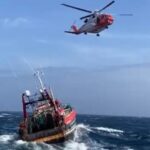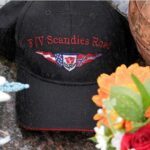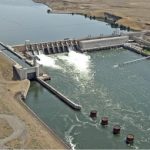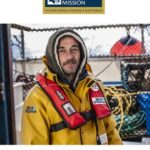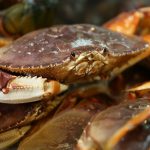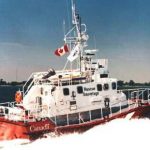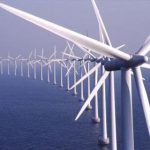FFAW bloated with millions more in fees and government revenue than union dues: FISH-NL
 FOR IMMEDIATE RELEASE Wednesday, Sept. 12, 2017
FOR IMMEDIATE RELEASE Wednesday, Sept. 12, 2017
The Federation of Independent Sea Harvesters of Newfoundland and Labrador (FISH-NL) estimates the FFAW-Unifor will be fed by almost $5 million more this year from harvester fees and government sources than from membership dues, proving the union has lost its way.
“The FFAW-Unifor has mutated into a labour sea monster with tentacles in management, science, dockside monitoring, grading, professionalization, and safety,” says Ryan Cleary, President of FISH-NL.
“It’s often said that the FFAW doesn’t make money from fishermen, but through fishermen. The union executive grows fat with huge salaries and pensions while inshore harvesters are being starved out.”
In 2017, FISH-NL estimates the FFAW-Unifor will collect $7.9 million in fees from inshore harvesters for services such as dockside monitoring and grading, as well as from various government contracts/grants.
That compares to annual membership dues — at the high end — of $2.9 million. FISH-NL calculated that figure by multiplying the number of harvesters — which the FFAW-Unifor pegs at 9,500, a figure FISH-NL disputes — by the minimum dues of $310 a year (the most recent figure on the union website).
Meantime, FISH-NL has tallied the various revenue streams that will flow into the FFAW-Unifor this year, including:
• An estimated $3.3 million in dockside monitoring fees from inshore harvesters. Quotas for most species have been slashed in recent years, but the FFAW-Unifor-controlled Fish Harvesters Resource Centres (FRC) — which has the “exclusive” contract for dockside monitoring in the province — has increased its fees, which vary by species. It’s not clear how the FFAW-Unifor can have the “exclusive” contract for dockside monitoring when current federal policy clearly forbids it as a conflict of interest.
• $976,939 in fees were collected in 2016 by the FFAW-controlled Professional Fish Harvesters Certification Board, which is mandated by provincial legislation to register and certify commercial fish harvesters. A similar amount is expected to be collected by the board this year. Annual fees charged to harvesters were raised in 2016 to $75 from $50.
• $660,000 is expected to be collected in cod grading fees from inshore harvesters. The FFAW-Unifor is paid 1 cent for every pound of cod purchased by processors — money for union graders to “independently” check the sampling/grading process at the plant. In 2017, an estimated 30,000 tonnes of cod will be landed around the province. Harvesters have long demanded that fish be graded at the wharf — not the plant.
• $1.1 million is to be paid by Ottawa this year to the FFAW-Unifor for two major cod sentinel fishery contracts in waters around the province. The sentinel or test fisheries were developed in the mid-1990s during the moratorium years, but the results have since been skewed, scientists and harvesters agree, by the resumption of the commercial or stewardship cod fishery. FISH-NL recommended the sentinel fisheries contracts be cancelled this year until they can be updated, but Ottawa refused.
• $197,000 was earned by the union in 2016 from the sale of roughly 169 tonnes of cod taken in the sentinel fisheries, according to information obtained through the federal Access to Information Act. A similar amount is expected to be collected this year.
• $150,000 was invested this year by the province in the FFAW-controlled Newfoundland and Labrador Fish Harvesting Safety Association. This is the final year of a five-year, $750,000 funding commitment by the province, and the Workplace, Health, Safety and Compensation Commission.
• An estimated $120,000 is to be paid this year to the FFAW-controlled Fisheries, Science, Stewardship and Sustainability Board (FSSSB) from the sale of halibut tags to inshore harvesters from the Great Northern Peninsula and western Newfoundland (fishing zone 4R). Inshore harvesters from the Maritimes and Quebec do not pay for halibut tags.
• $170,000 was announced this week by the province in funding to the FFAW/FSSSB for three different projects under the $2-million Seafood Innovation and Transition Program.
• $1.2 million in federal funding was granted to the FFAW in 2016 for the Fisheries Science Collaborative Program (FSCP). Approved projects include snow crab pot surveys, a lobster monitoring project, and cod tagging. It’s believed the funding was automatically renewed for 2017.
The FFAW-Unifor is also said to be allocated quota for DFO’s annual crab survey, for which the union is paid 20 cents a pound. It’s not known how much crab is set aside for the overall survey.
Besides the government funding and fees from harvesters, the FFAW-Unifor is also said to receive funding from the oil and gas industry — either directly through fees such as marine escorts, or indirectly through One Ocean, a “liaison” organization created in 2006 to represent the “mutual interests” of both industries.
Despite requests by the media, the FFAW-Unifor has refused to reveal the amount of money the oil and gas industry contributes to its coffers.
In 2015, the union signed a five-year memorandum of understanding with the World Wildlife Fund for a northern cod fisheries improvement project, although it’s not known how much funding is involved.
FISH-NL calls upon the union to release a full statement of all earnings for the latest year to ensure transparency and accountability to its members.
Inshore harvesters are the most controlled labour group in the country, with no medical, dental or pension benefits. Harvesters do not have the right to strike, and are refused access to free enterprise with the provincial government’s refusal to allow outside fish buyers into the province.
FISH-NL wrote the Labour Relations Board in mid-August requesting an immediate vote for inshore harvesters to decide their future, based on the unreasonable delay in the handling of FISH-NL’s application for certification, now in its ninth month.
Contact Ryan Cleary: 682 4862

































